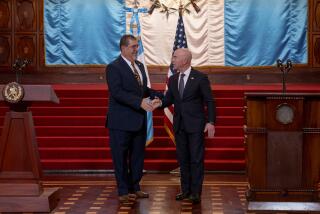Leader Cites Guatemalan Neutrality
- Share via
WASHINGTON — Guatemalan President-elect Vinicio Cerezo Arevalo declared his “active neutrality” Tuesday in U.S. disputes with Nicaragua’s Sandinista regime but said he is counting on American assistance to help restore democracy in his country.
In Washington for a two-day visit, Cerezo was emphatic in resisting taking sides in the U.S.-Nicaraguan conflict. At a news conference, he defended his visit to Managua last week, saying, “I’m not going to be converted to communism” by talking with Nicaragua’s leftist president, Daniel Ortega.
“I consider myself a friend of the United States,” Cerezo said. But, he added, as a man committed to the middle of the road, “I need to consult with both sides.”
Emphasis on Peace
The 43-year-old Christian Democrat said he hopes to emphasize the peaceful settlement of Central America’s conflicts outside the context of a larger East-West dispute. Within his own nation, he said, his principal aim after taking office Jan. 14 will be to gain control over the army, which has ruled Guatemala for 31 years, by appointing his own candidates to key posts.
In addition, he said, he will also seek the reorganization of the national police and the appointment of an “honest and independent” Supreme Court.
Cerezo, who was elected Dec. 8, was candid in assessing his chances of winning a fight with the still-powerful military Establishment, saying, “If, after two days, I remain in power, I am going to wear well.”
Meetings With Bush, Baker
He denied that he would immediately seek either economic or military aid on his visit here, which includes meetings with Vice President George Bush, Treasury Secretary James A. Baker III, State Department officials and congressional leaders.
But he said he wants to talk about economic assistance “in the near future,” adding, “My perception of the United States for a long time has been that they would have to give support to democracy.”
U.S. military aid to Guatemala was cut off during the Jimmy Carter Administration, and the Reagan Administration is now considering its restoration, but Cerezo said such assistance is not what his country needs.
“Our object is not to have the best army but to have the best democracy,” he asserted.
Finance Aide Present
Accompanying Cerezo was his designated finance minister, Rodolfo Paiz, who said that the new Guatemalan regime would not make any early attempt to promote land reform. Paiz said that a key element of the new government’s democratization plan would be the formation of local development councils in which the public would participate in determining economic policy.
Richard Millett, a Central American scholar from the University of Southern Illinois, said the task of leading Guatemala to democracy is akin to “walking a tightrope across Grand Canyon.”
In an analysis following Cerezo’s news conference, Millett said that the current drought in Brazil’s coffee-producing states may be of more importance than U.S. aid to the crucial area of economic recovery. The Brazilian drought, which he described as “one of the worst in history,” likely will boost the price of Guatemala’s major export, coffee.
More to Read
Sign up for Essential California
The most important California stories and recommendations in your inbox every morning.
You may occasionally receive promotional content from the Los Angeles Times.













